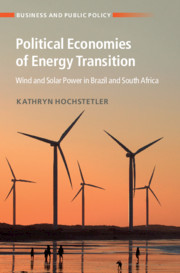Description
Political Economies of Energy Transition
Wind and Solar Power in Brazil and South Africa
Business and Public Policy Series
Author: Hochstetler Kathryn
Shows that economic concerns about jobs, costs, and consumption, rather than climate change, are likely to drive energy transition in developing countries.
Language: English
Subject for Political Economies of Energy Transition:
Approximative price 34.17 €
In Print (Delivery period: 14 days).
Add to cart
Political Economies of Energy Transition
Publication date: 03-2024
293 p. · Paperback
Publication date: 03-2024
293 p. · Paperback
Approximative price 102.80 €
In Print (Delivery period: 14 days).
Add to cart
Political Economies of Energy Transition
Publication date: 11-2020
270 p. · 23.5x16 cm · Hardback
Publication date: 11-2020
270 p. · 23.5x16 cm · Hardback
Description
/li>Contents
/li>Biography
/li>
Global climate solutions depend on low-carbon energy transitions in developing countries, but little is known about how those will unfold. Examining the transitions of Brazil and South Africa, Hochstetler reveals how choices about wind and solar power respond to four different constellations of interests and institutions, or four simultaneous political economies of energy transition. The political economy of climate change set Brazil and South Africa on different tracks, with South Africa's coal-based electricity system fighting against an existential threat. Since deforestation dominates Brazil's climate emissions, climate concerns were secondary there for electricity planning. Both saw significant mobilization around industrial policy and cost and consumption issues, showing the importance of economic considerations for electricity choices in emerging economies. Host communities resisted Brazilian wind power, but accepted other forms. Hochstetler argues that national energy transition finally depends on the intersection of these political economies, with South Africa illustrating a politicized transition mode and Brazil presenting a bureaucracy-dominant one.
1. Political economies of energy transition in Brazil and South Africa; 2. Wind and solar power in the transition to a low-carbon economy; 3. States, markets, and energy transition: good industrial policy?; 4. Electricity consumption in Brazil and South Africa: distribution and prices; 5. People and place: siting wind and solar plants in Brazil and South Africa; 6. Political economies of energy transition.
Kathryn Hochstetler is Professor of International Development at the London School of Economics and Political Science. Her book Greening Brazil: Environmental Activism in State and Society (co-authored with Margaret E. Keck, 2007) received the Lynton Caldwell Prize from the Science, Technology, and Environmental Politics section of the American Political Science Association.
© 2024 LAVOISIER S.A.S.




